TLAW 402 Company Law Case Study: Directors' Duties and Liabilities
VerifiedAdded on 2022/11/18
|9
|2095
|273
Case Study
AI Summary
This case study analyzes a scenario involving Shilpa and Sonal, the directors of Sonu Pty Ltd, a company facing financial difficulties. The assignment explores the legal implications of their actions under the Corporations Act 2001. Part (a) focuses on whether the liquidator can sue the directors for debt recovery, examining issues such as insolvent trading, breach of directors' duties (including sections 180-184), and potential liabilities. The analysis considers relevant sections of the Act, including 477, 588FDA, 588FGA, and the duties of care, diligence, and good faith. Part (b) investigates the consequences for Shilpa and Sonal if they breached the Corporations Act, referencing section 1317 E and discussing potential civil and criminal penalties, including pecuniary penalties and disqualification orders. The case study highlights the importance of financial record-keeping, the responsibilities of directors, and the potential for personal liability in corporate insolvency. The case study concludes that both directors could face both civil and criminal penalties under the law.
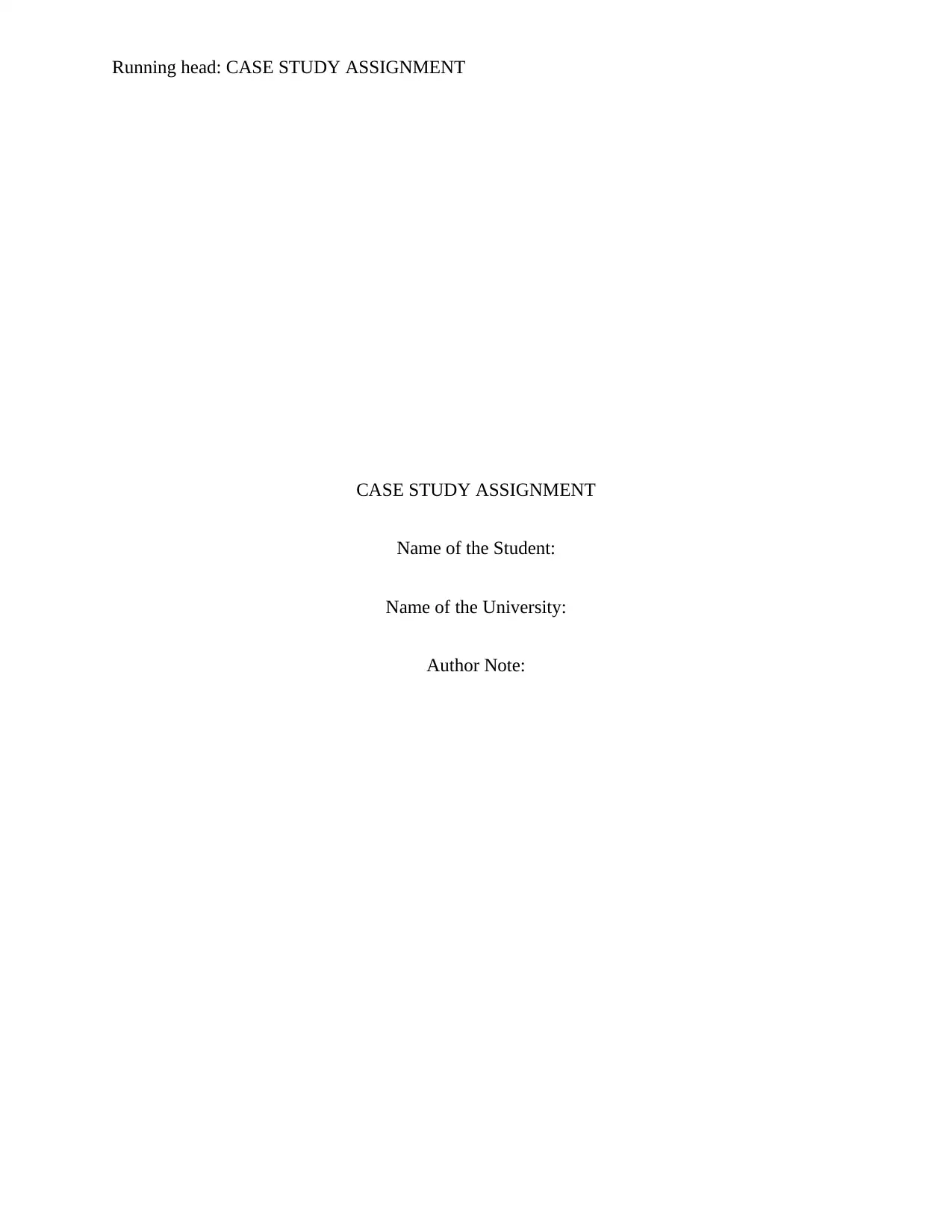
Running head: CASE STUDY ASSIGNMENT
CASE STUDY ASSIGNMENT
Name of the Student:
Name of the University:
Author Note:
CASE STUDY ASSIGNMENT
Name of the Student:
Name of the University:
Author Note:
Paraphrase This Document
Need a fresh take? Get an instant paraphrase of this document with our AI Paraphraser
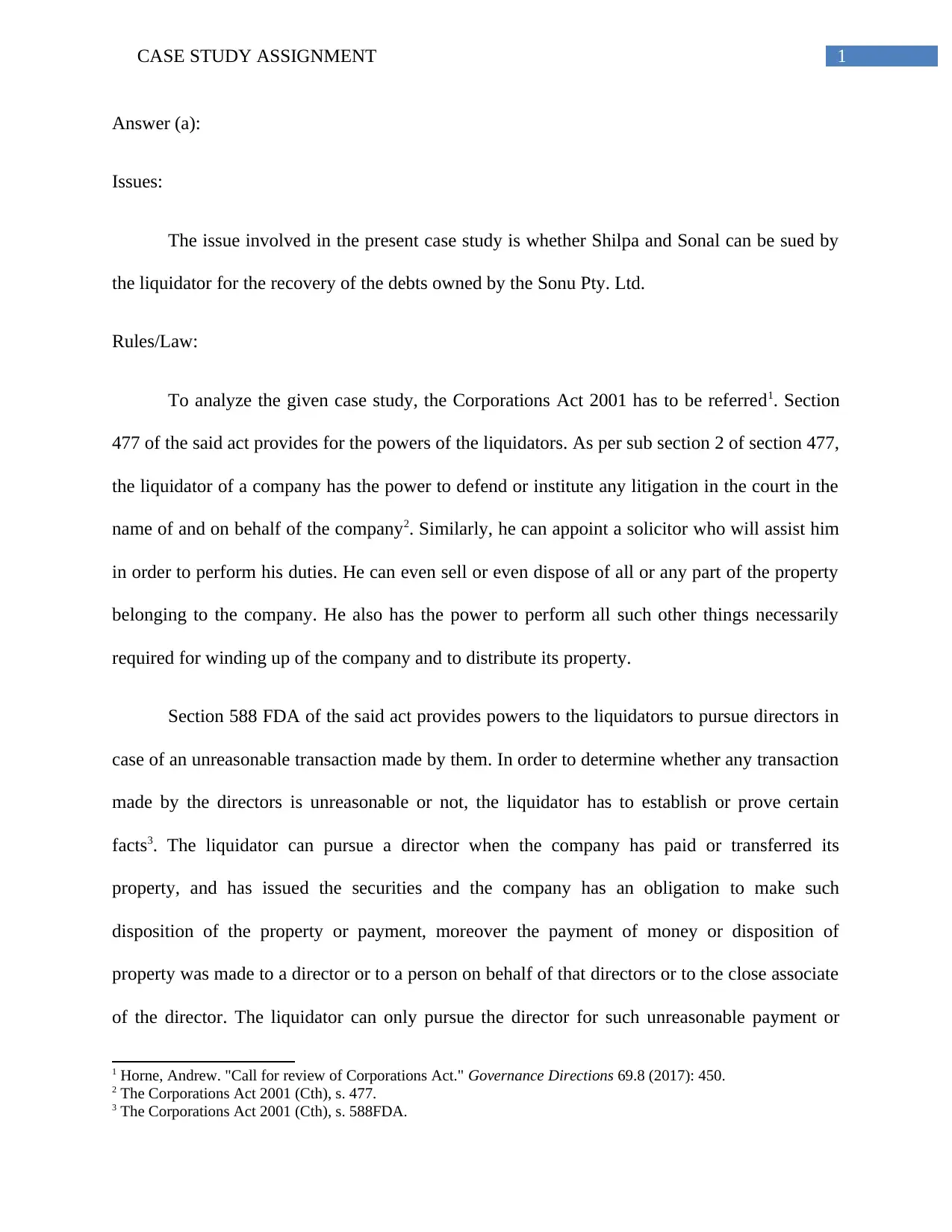
1CASE STUDY ASSIGNMENT
Answer (a):
Issues:
The issue involved in the present case study is whether Shilpa and Sonal can be sued by
the liquidator for the recovery of the debts owned by the Sonu Pty. Ltd.
Rules/Law:
To analyze the given case study, the Corporations Act 2001 has to be referred1. Section
477 of the said act provides for the powers of the liquidators. As per sub section 2 of section 477,
the liquidator of a company has the power to defend or institute any litigation in the court in the
name of and on behalf of the company2. Similarly, he can appoint a solicitor who will assist him
in order to perform his duties. He can even sell or even dispose of all or any part of the property
belonging to the company. He also has the power to perform all such other things necessarily
required for winding up of the company and to distribute its property.
Section 588 FDA of the said act provides powers to the liquidators to pursue directors in
case of an unreasonable transaction made by them. In order to determine whether any transaction
made by the directors is unreasonable or not, the liquidator has to establish or prove certain
facts3. The liquidator can pursue a director when the company has paid or transferred its
property, and has issued the securities and the company has an obligation to make such
disposition of the property or payment, moreover the payment of money or disposition of
property was made to a director or to a person on behalf of that directors or to the close associate
of the director. The liquidator can only pursue the director for such unreasonable payment or
1 Horne, Andrew. "Call for review of Corporations Act." Governance Directions 69.8 (2017): 450.
2 The Corporations Act 2001 (Cth), s. 477.
3 The Corporations Act 2001 (Cth), s. 588FDA.
Answer (a):
Issues:
The issue involved in the present case study is whether Shilpa and Sonal can be sued by
the liquidator for the recovery of the debts owned by the Sonu Pty. Ltd.
Rules/Law:
To analyze the given case study, the Corporations Act 2001 has to be referred1. Section
477 of the said act provides for the powers of the liquidators. As per sub section 2 of section 477,
the liquidator of a company has the power to defend or institute any litigation in the court in the
name of and on behalf of the company2. Similarly, he can appoint a solicitor who will assist him
in order to perform his duties. He can even sell or even dispose of all or any part of the property
belonging to the company. He also has the power to perform all such other things necessarily
required for winding up of the company and to distribute its property.
Section 588 FDA of the said act provides powers to the liquidators to pursue directors in
case of an unreasonable transaction made by them. In order to determine whether any transaction
made by the directors is unreasonable or not, the liquidator has to establish or prove certain
facts3. The liquidator can pursue a director when the company has paid or transferred its
property, and has issued the securities and the company has an obligation to make such
disposition of the property or payment, moreover the payment of money or disposition of
property was made to a director or to a person on behalf of that directors or to the close associate
of the director. The liquidator can only pursue the director for such unreasonable payment or
1 Horne, Andrew. "Call for review of Corporations Act." Governance Directions 69.8 (2017): 450.
2 The Corporations Act 2001 (Cth), s. 477.
3 The Corporations Act 2001 (Cth), s. 588FDA.
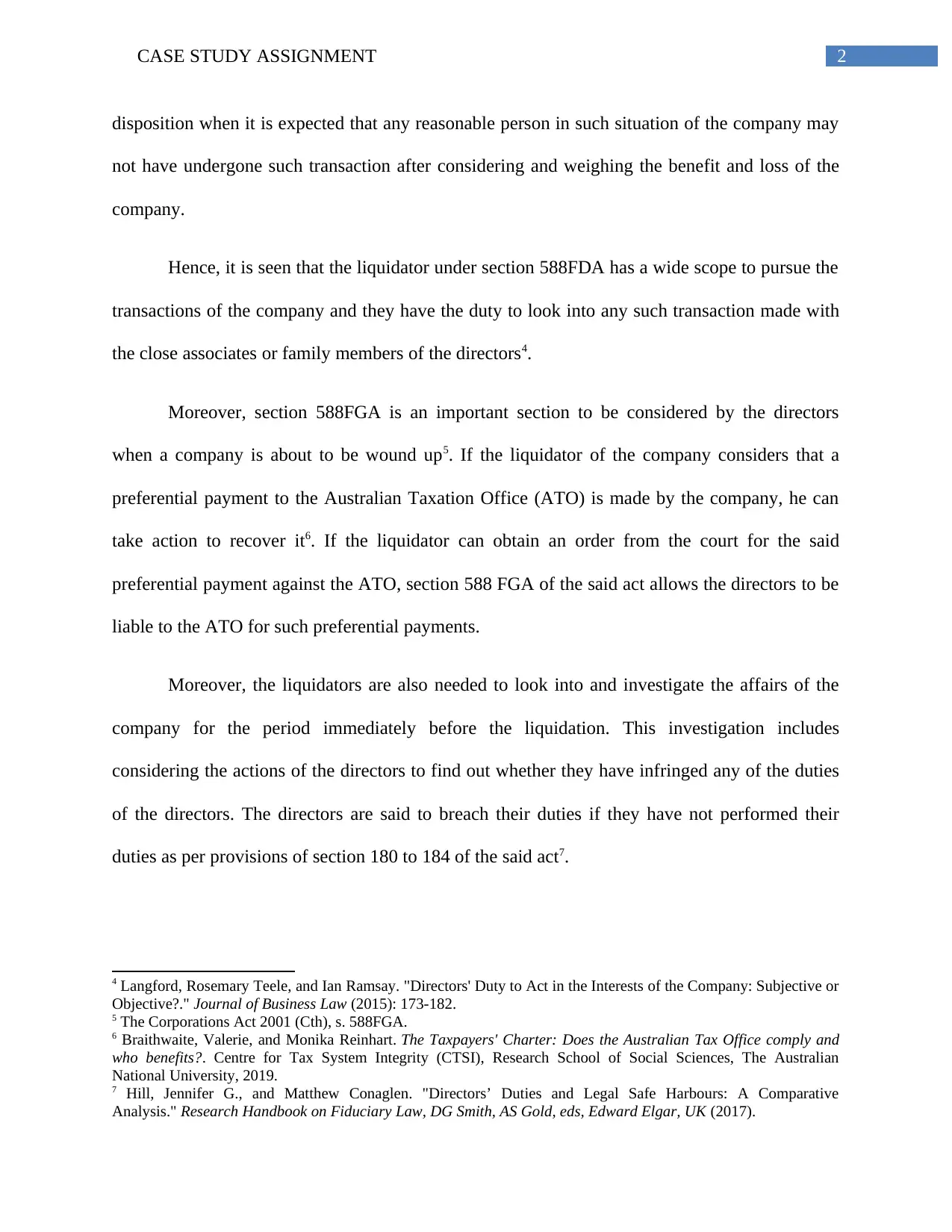
2CASE STUDY ASSIGNMENT
disposition when it is expected that any reasonable person in such situation of the company may
not have undergone such transaction after considering and weighing the benefit and loss of the
company.
Hence, it is seen that the liquidator under section 588FDA has a wide scope to pursue the
transactions of the company and they have the duty to look into any such transaction made with
the close associates or family members of the directors4.
Moreover, section 588FGA is an important section to be considered by the directors
when a company is about to be wound up5. If the liquidator of the company considers that a
preferential payment to the Australian Taxation Office (ATO) is made by the company, he can
take action to recover it6. If the liquidator can obtain an order from the court for the said
preferential payment against the ATO, section 588 FGA of the said act allows the directors to be
liable to the ATO for such preferential payments.
Moreover, the liquidators are also needed to look into and investigate the affairs of the
company for the period immediately before the liquidation. This investigation includes
considering the actions of the directors to find out whether they have infringed any of the duties
of the directors. The directors are said to breach their duties if they have not performed their
duties as per provisions of section 180 to 184 of the said act7.
4 Langford, Rosemary Teele, and Ian Ramsay. "Directors' Duty to Act in the Interests of the Company: Subjective or
Objective?." Journal of Business Law (2015): 173-182.
5 The Corporations Act 2001 (Cth), s. 588FGA.
6 Braithwaite, Valerie, and Monika Reinhart. The Taxpayers' Charter: Does the Australian Tax Office comply and
who benefits?. Centre for Tax System Integrity (CTSI), Research School of Social Sciences, The Australian
National University, 2019.
7 Hill, Jennifer G., and Matthew Conaglen. "Directors’ Duties and Legal Safe Harbours: A Comparative
Analysis." Research Handbook on Fiduciary Law, DG Smith, AS Gold, eds, Edward Elgar, UK (2017).
disposition when it is expected that any reasonable person in such situation of the company may
not have undergone such transaction after considering and weighing the benefit and loss of the
company.
Hence, it is seen that the liquidator under section 588FDA has a wide scope to pursue the
transactions of the company and they have the duty to look into any such transaction made with
the close associates or family members of the directors4.
Moreover, section 588FGA is an important section to be considered by the directors
when a company is about to be wound up5. If the liquidator of the company considers that a
preferential payment to the Australian Taxation Office (ATO) is made by the company, he can
take action to recover it6. If the liquidator can obtain an order from the court for the said
preferential payment against the ATO, section 588 FGA of the said act allows the directors to be
liable to the ATO for such preferential payments.
Moreover, the liquidators are also needed to look into and investigate the affairs of the
company for the period immediately before the liquidation. This investigation includes
considering the actions of the directors to find out whether they have infringed any of the duties
of the directors. The directors are said to breach their duties if they have not performed their
duties as per provisions of section 180 to 184 of the said act7.
4 Langford, Rosemary Teele, and Ian Ramsay. "Directors' Duty to Act in the Interests of the Company: Subjective or
Objective?." Journal of Business Law (2015): 173-182.
5 The Corporations Act 2001 (Cth), s. 588FGA.
6 Braithwaite, Valerie, and Monika Reinhart. The Taxpayers' Charter: Does the Australian Tax Office comply and
who benefits?. Centre for Tax System Integrity (CTSI), Research School of Social Sciences, The Australian
National University, 2019.
7 Hill, Jennifer G., and Matthew Conaglen. "Directors’ Duties and Legal Safe Harbours: A Comparative
Analysis." Research Handbook on Fiduciary Law, DG Smith, AS Gold, eds, Edward Elgar, UK (2017).
⊘ This is a preview!⊘
Do you want full access?
Subscribe today to unlock all pages.

Trusted by 1+ million students worldwide
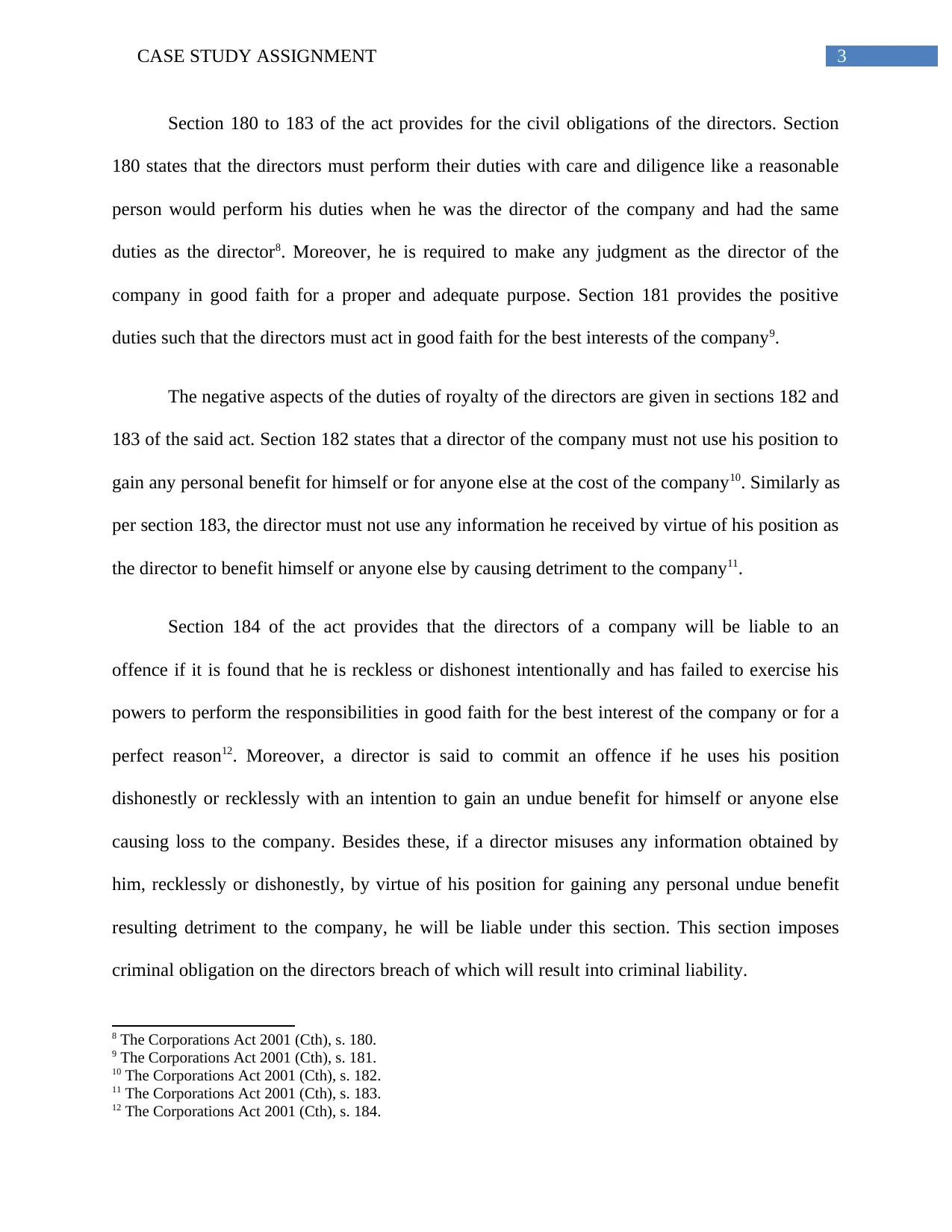
3CASE STUDY ASSIGNMENT
Section 180 to 183 of the act provides for the civil obligations of the directors. Section
180 states that the directors must perform their duties with care and diligence like a reasonable
person would perform his duties when he was the director of the company and had the same
duties as the director8. Moreover, he is required to make any judgment as the director of the
company in good faith for a proper and adequate purpose. Section 181 provides the positive
duties such that the directors must act in good faith for the best interests of the company9.
The negative aspects of the duties of royalty of the directors are given in sections 182 and
183 of the said act. Section 182 states that a director of the company must not use his position to
gain any personal benefit for himself or for anyone else at the cost of the company10. Similarly as
per section 183, the director must not use any information he received by virtue of his position as
the director to benefit himself or anyone else by causing detriment to the company11.
Section 184 of the act provides that the directors of a company will be liable to an
offence if it is found that he is reckless or dishonest intentionally and has failed to exercise his
powers to perform the responsibilities in good faith for the best interest of the company or for a
perfect reason12. Moreover, a director is said to commit an offence if he uses his position
dishonestly or recklessly with an intention to gain an undue benefit for himself or anyone else
causing loss to the company. Besides these, if a director misuses any information obtained by
him, recklessly or dishonestly, by virtue of his position for gaining any personal undue benefit
resulting detriment to the company, he will be liable under this section. This section imposes
criminal obligation on the directors breach of which will result into criminal liability.
8 The Corporations Act 2001 (Cth), s. 180.
9 The Corporations Act 2001 (Cth), s. 181.
10 The Corporations Act 2001 (Cth), s. 182.
11 The Corporations Act 2001 (Cth), s. 183.
12 The Corporations Act 2001 (Cth), s. 184.
Section 180 to 183 of the act provides for the civil obligations of the directors. Section
180 states that the directors must perform their duties with care and diligence like a reasonable
person would perform his duties when he was the director of the company and had the same
duties as the director8. Moreover, he is required to make any judgment as the director of the
company in good faith for a proper and adequate purpose. Section 181 provides the positive
duties such that the directors must act in good faith for the best interests of the company9.
The negative aspects of the duties of royalty of the directors are given in sections 182 and
183 of the said act. Section 182 states that a director of the company must not use his position to
gain any personal benefit for himself or for anyone else at the cost of the company10. Similarly as
per section 183, the director must not use any information he received by virtue of his position as
the director to benefit himself or anyone else by causing detriment to the company11.
Section 184 of the act provides that the directors of a company will be liable to an
offence if it is found that he is reckless or dishonest intentionally and has failed to exercise his
powers to perform the responsibilities in good faith for the best interest of the company or for a
perfect reason12. Moreover, a director is said to commit an offence if he uses his position
dishonestly or recklessly with an intention to gain an undue benefit for himself or anyone else
causing loss to the company. Besides these, if a director misuses any information obtained by
him, recklessly or dishonestly, by virtue of his position for gaining any personal undue benefit
resulting detriment to the company, he will be liable under this section. This section imposes
criminal obligation on the directors breach of which will result into criminal liability.
8 The Corporations Act 2001 (Cth), s. 180.
9 The Corporations Act 2001 (Cth), s. 181.
10 The Corporations Act 2001 (Cth), s. 182.
11 The Corporations Act 2001 (Cth), s. 183.
12 The Corporations Act 2001 (Cth), s. 184.
Paraphrase This Document
Need a fresh take? Get an instant paraphrase of this document with our AI Paraphraser
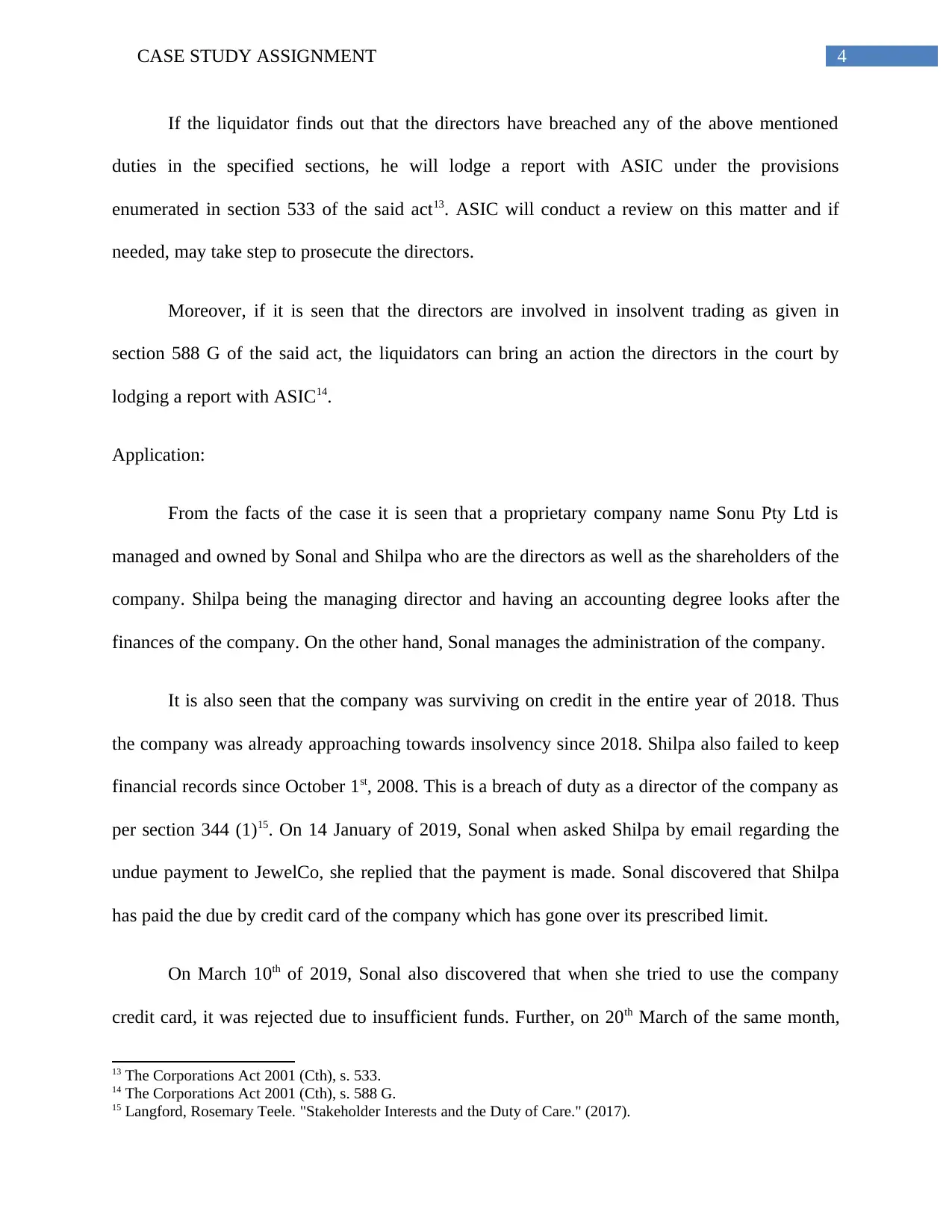
4CASE STUDY ASSIGNMENT
If the liquidator finds out that the directors have breached any of the above mentioned
duties in the specified sections, he will lodge a report with ASIC under the provisions
enumerated in section 533 of the said act13. ASIC will conduct a review on this matter and if
needed, may take step to prosecute the directors.
Moreover, if it is seen that the directors are involved in insolvent trading as given in
section 588 G of the said act, the liquidators can bring an action the directors in the court by
lodging a report with ASIC14.
Application:
From the facts of the case it is seen that a proprietary company name Sonu Pty Ltd is
managed and owned by Sonal and Shilpa who are the directors as well as the shareholders of the
company. Shilpa being the managing director and having an accounting degree looks after the
finances of the company. On the other hand, Sonal manages the administration of the company.
It is also seen that the company was surviving on credit in the entire year of 2018. Thus
the company was already approaching towards insolvency since 2018. Shilpa also failed to keep
financial records since October 1st, 2008. This is a breach of duty as a director of the company as
per section 344 (1)15. On 14 January of 2019, Sonal when asked Shilpa by email regarding the
undue payment to JewelCo, she replied that the payment is made. Sonal discovered that Shilpa
has paid the due by credit card of the company which has gone over its prescribed limit.
On March 10th of 2019, Sonal also discovered that when she tried to use the company
credit card, it was rejected due to insufficient funds. Further, on 20th March of the same month,
13 The Corporations Act 2001 (Cth), s. 533.
14 The Corporations Act 2001 (Cth), s. 588 G.
15 Langford, Rosemary Teele. "Stakeholder Interests and the Duty of Care." (2017).
If the liquidator finds out that the directors have breached any of the above mentioned
duties in the specified sections, he will lodge a report with ASIC under the provisions
enumerated in section 533 of the said act13. ASIC will conduct a review on this matter and if
needed, may take step to prosecute the directors.
Moreover, if it is seen that the directors are involved in insolvent trading as given in
section 588 G of the said act, the liquidators can bring an action the directors in the court by
lodging a report with ASIC14.
Application:
From the facts of the case it is seen that a proprietary company name Sonu Pty Ltd is
managed and owned by Sonal and Shilpa who are the directors as well as the shareholders of the
company. Shilpa being the managing director and having an accounting degree looks after the
finances of the company. On the other hand, Sonal manages the administration of the company.
It is also seen that the company was surviving on credit in the entire year of 2018. Thus
the company was already approaching towards insolvency since 2018. Shilpa also failed to keep
financial records since October 1st, 2008. This is a breach of duty as a director of the company as
per section 344 (1)15. On 14 January of 2019, Sonal when asked Shilpa by email regarding the
undue payment to JewelCo, she replied that the payment is made. Sonal discovered that Shilpa
has paid the due by credit card of the company which has gone over its prescribed limit.
On March 10th of 2019, Sonal also discovered that when she tried to use the company
credit card, it was rejected due to insufficient funds. Further, on 20th March of the same month,
13 The Corporations Act 2001 (Cth), s. 533.
14 The Corporations Act 2001 (Cth), s. 588 G.
15 Langford, Rosemary Teele. "Stakeholder Interests and the Duty of Care." (2017).
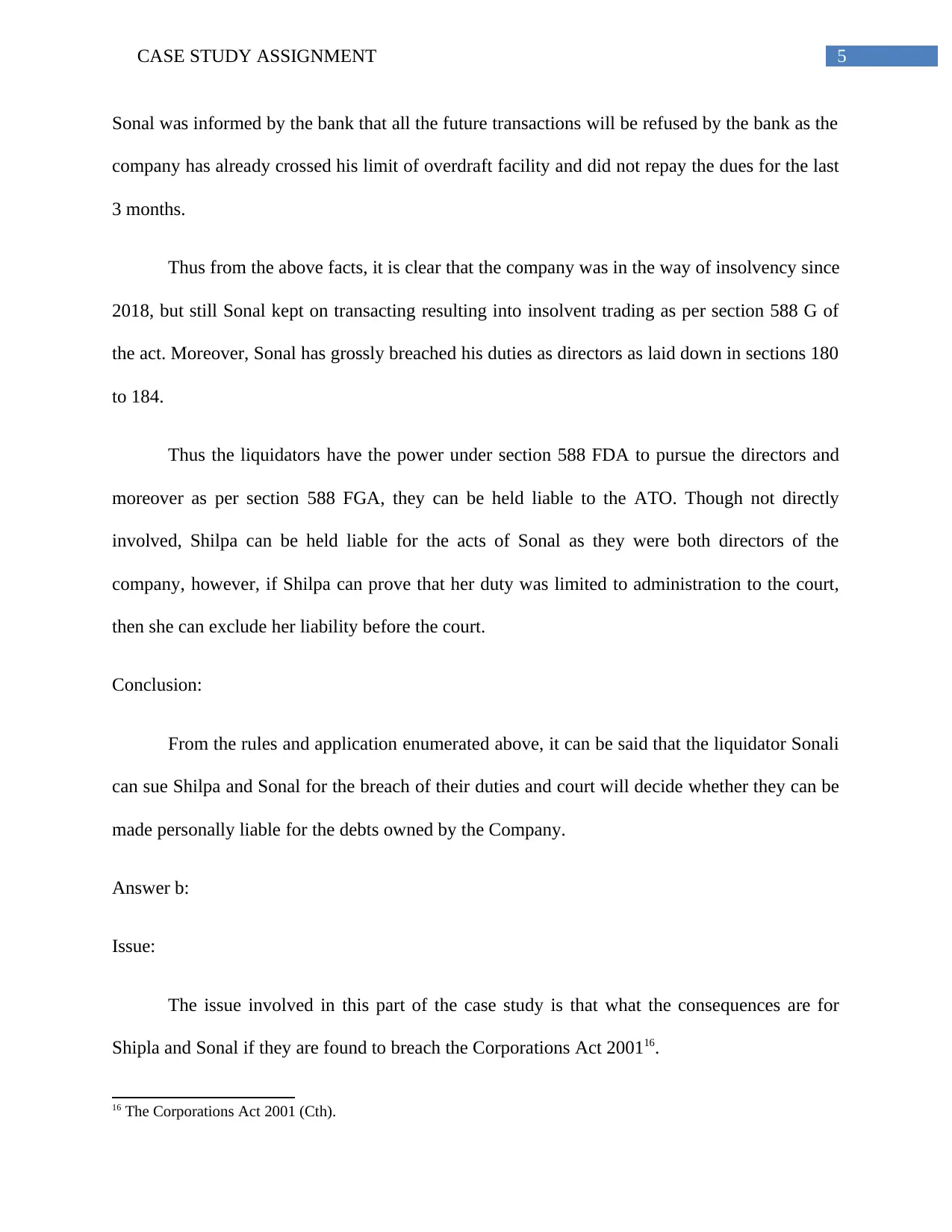
5CASE STUDY ASSIGNMENT
Sonal was informed by the bank that all the future transactions will be refused by the bank as the
company has already crossed his limit of overdraft facility and did not repay the dues for the last
3 months.
Thus from the above facts, it is clear that the company was in the way of insolvency since
2018, but still Sonal kept on transacting resulting into insolvent trading as per section 588 G of
the act. Moreover, Sonal has grossly breached his duties as directors as laid down in sections 180
to 184.
Thus the liquidators have the power under section 588 FDA to pursue the directors and
moreover as per section 588 FGA, they can be held liable to the ATO. Though not directly
involved, Shilpa can be held liable for the acts of Sonal as they were both directors of the
company, however, if Shilpa can prove that her duty was limited to administration to the court,
then she can exclude her liability before the court.
Conclusion:
From the rules and application enumerated above, it can be said that the liquidator Sonali
can sue Shilpa and Sonal for the breach of their duties and court will decide whether they can be
made personally liable for the debts owned by the Company.
Answer b:
Issue:
The issue involved in this part of the case study is that what the consequences are for
Shipla and Sonal if they are found to breach the Corporations Act 200116.
16 The Corporations Act 2001 (Cth).
Sonal was informed by the bank that all the future transactions will be refused by the bank as the
company has already crossed his limit of overdraft facility and did not repay the dues for the last
3 months.
Thus from the above facts, it is clear that the company was in the way of insolvency since
2018, but still Sonal kept on transacting resulting into insolvent trading as per section 588 G of
the act. Moreover, Sonal has grossly breached his duties as directors as laid down in sections 180
to 184.
Thus the liquidators have the power under section 588 FDA to pursue the directors and
moreover as per section 588 FGA, they can be held liable to the ATO. Though not directly
involved, Shilpa can be held liable for the acts of Sonal as they were both directors of the
company, however, if Shilpa can prove that her duty was limited to administration to the court,
then she can exclude her liability before the court.
Conclusion:
From the rules and application enumerated above, it can be said that the liquidator Sonali
can sue Shilpa and Sonal for the breach of their duties and court will decide whether they can be
made personally liable for the debts owned by the Company.
Answer b:
Issue:
The issue involved in this part of the case study is that what the consequences are for
Shipla and Sonal if they are found to breach the Corporations Act 200116.
16 The Corporations Act 2001 (Cth).
⊘ This is a preview!⊘
Do you want full access?
Subscribe today to unlock all pages.

Trusted by 1+ million students worldwide
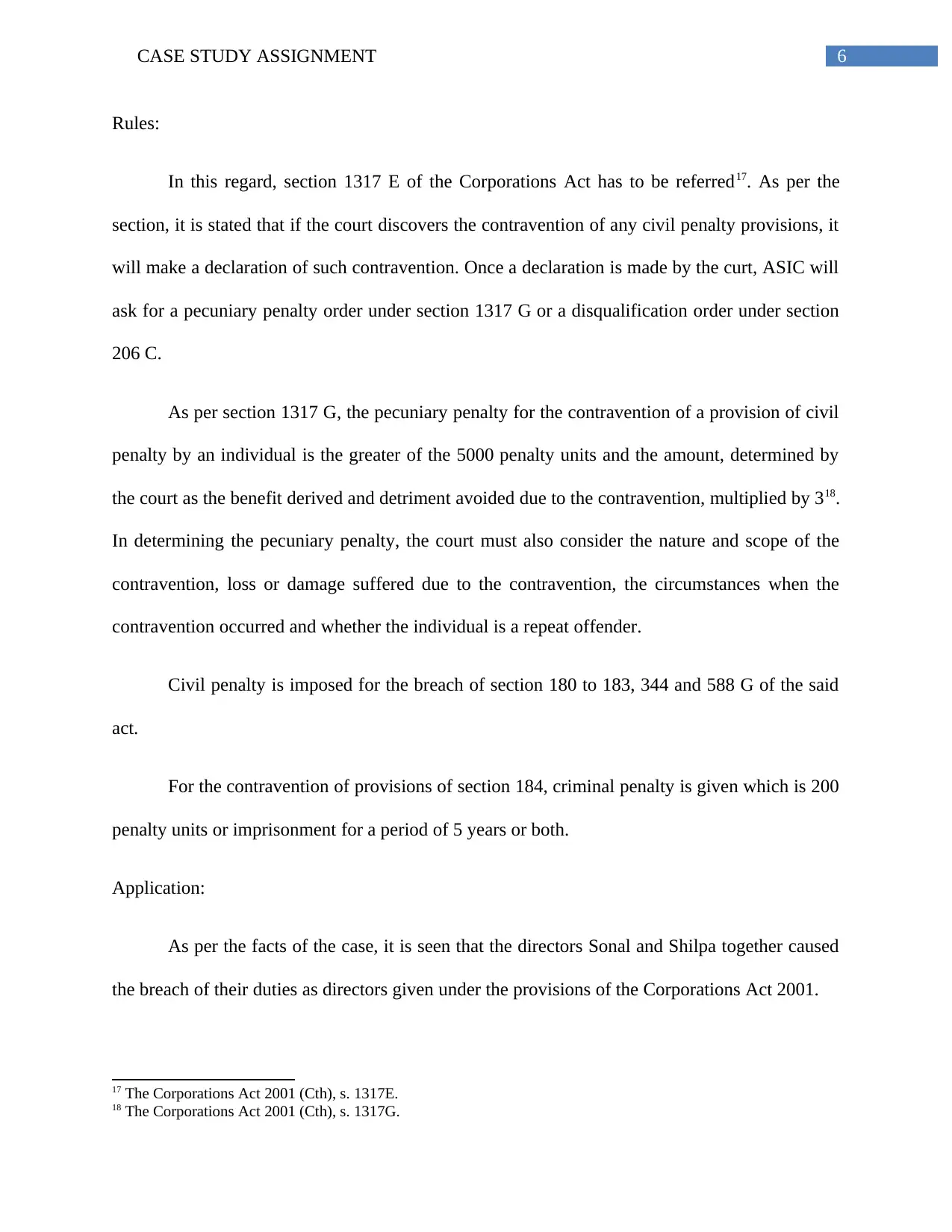
6CASE STUDY ASSIGNMENT
Rules:
In this regard, section 1317 E of the Corporations Act has to be referred17. As per the
section, it is stated that if the court discovers the contravention of any civil penalty provisions, it
will make a declaration of such contravention. Once a declaration is made by the curt, ASIC will
ask for a pecuniary penalty order under section 1317 G or a disqualification order under section
206 C.
As per section 1317 G, the pecuniary penalty for the contravention of a provision of civil
penalty by an individual is the greater of the 5000 penalty units and the amount, determined by
the court as the benefit derived and detriment avoided due to the contravention, multiplied by 318.
In determining the pecuniary penalty, the court must also consider the nature and scope of the
contravention, loss or damage suffered due to the contravention, the circumstances when the
contravention occurred and whether the individual is a repeat offender.
Civil penalty is imposed for the breach of section 180 to 183, 344 and 588 G of the said
act.
For the contravention of provisions of section 184, criminal penalty is given which is 200
penalty units or imprisonment for a period of 5 years or both.
Application:
As per the facts of the case, it is seen that the directors Sonal and Shilpa together caused
the breach of their duties as directors given under the provisions of the Corporations Act 2001.
17 The Corporations Act 2001 (Cth), s. 1317E.
18 The Corporations Act 2001 (Cth), s. 1317G.
Rules:
In this regard, section 1317 E of the Corporations Act has to be referred17. As per the
section, it is stated that if the court discovers the contravention of any civil penalty provisions, it
will make a declaration of such contravention. Once a declaration is made by the curt, ASIC will
ask for a pecuniary penalty order under section 1317 G or a disqualification order under section
206 C.
As per section 1317 G, the pecuniary penalty for the contravention of a provision of civil
penalty by an individual is the greater of the 5000 penalty units and the amount, determined by
the court as the benefit derived and detriment avoided due to the contravention, multiplied by 318.
In determining the pecuniary penalty, the court must also consider the nature and scope of the
contravention, loss or damage suffered due to the contravention, the circumstances when the
contravention occurred and whether the individual is a repeat offender.
Civil penalty is imposed for the breach of section 180 to 183, 344 and 588 G of the said
act.
For the contravention of provisions of section 184, criminal penalty is given which is 200
penalty units or imprisonment for a period of 5 years or both.
Application:
As per the facts of the case, it is seen that the directors Sonal and Shilpa together caused
the breach of their duties as directors given under the provisions of the Corporations Act 2001.
17 The Corporations Act 2001 (Cth), s. 1317E.
18 The Corporations Act 2001 (Cth), s. 1317G.
Paraphrase This Document
Need a fresh take? Get an instant paraphrase of this document with our AI Paraphraser
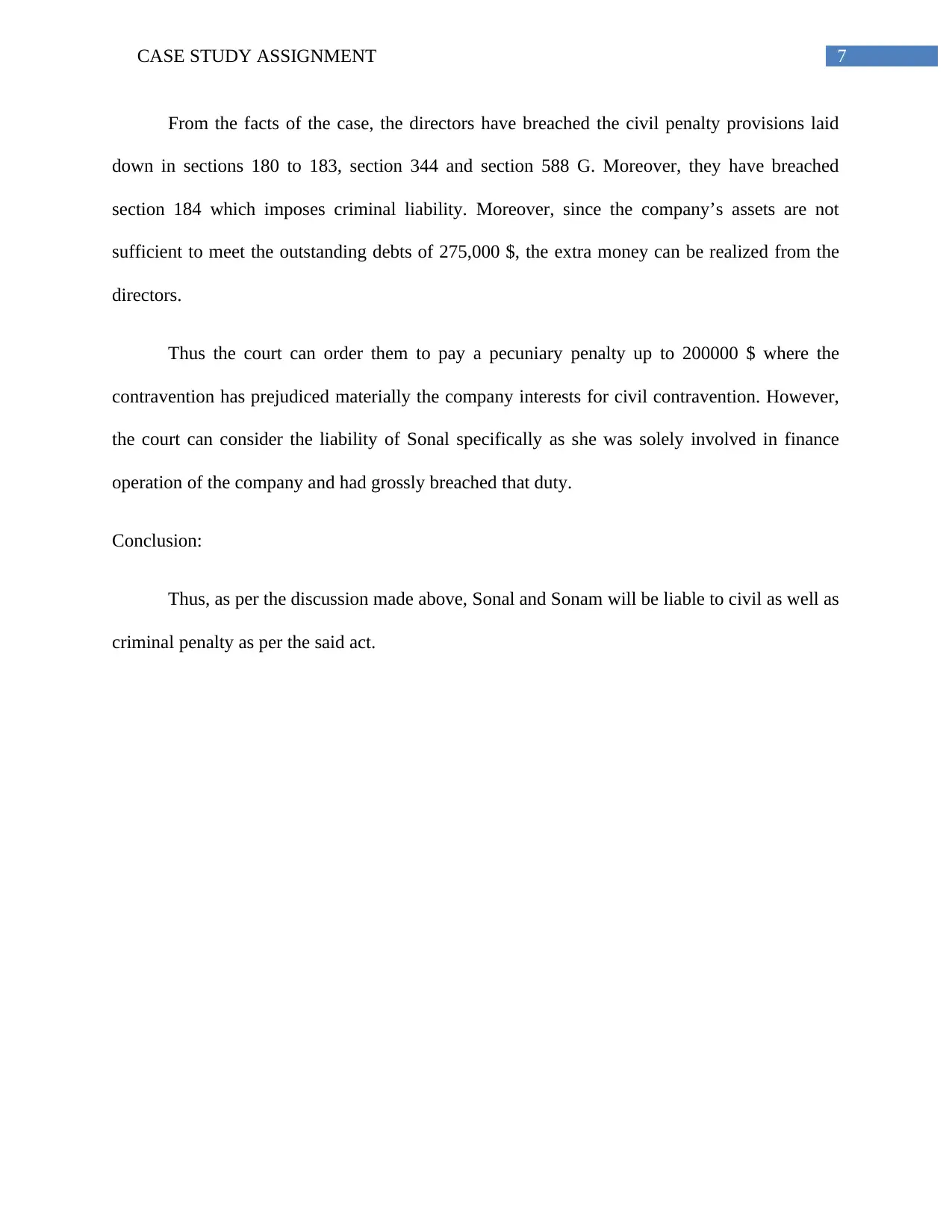
7CASE STUDY ASSIGNMENT
From the facts of the case, the directors have breached the civil penalty provisions laid
down in sections 180 to 183, section 344 and section 588 G. Moreover, they have breached
section 184 which imposes criminal liability. Moreover, since the company’s assets are not
sufficient to meet the outstanding debts of 275,000 $, the extra money can be realized from the
directors.
Thus the court can order them to pay a pecuniary penalty up to 200000 $ where the
contravention has prejudiced materially the company interests for civil contravention. However,
the court can consider the liability of Sonal specifically as she was solely involved in finance
operation of the company and had grossly breached that duty.
Conclusion:
Thus, as per the discussion made above, Sonal and Sonam will be liable to civil as well as
criminal penalty as per the said act.
From the facts of the case, the directors have breached the civil penalty provisions laid
down in sections 180 to 183, section 344 and section 588 G. Moreover, they have breached
section 184 which imposes criminal liability. Moreover, since the company’s assets are not
sufficient to meet the outstanding debts of 275,000 $, the extra money can be realized from the
directors.
Thus the court can order them to pay a pecuniary penalty up to 200000 $ where the
contravention has prejudiced materially the company interests for civil contravention. However,
the court can consider the liability of Sonal specifically as she was solely involved in finance
operation of the company and had grossly breached that duty.
Conclusion:
Thus, as per the discussion made above, Sonal and Sonam will be liable to civil as well as
criminal penalty as per the said act.
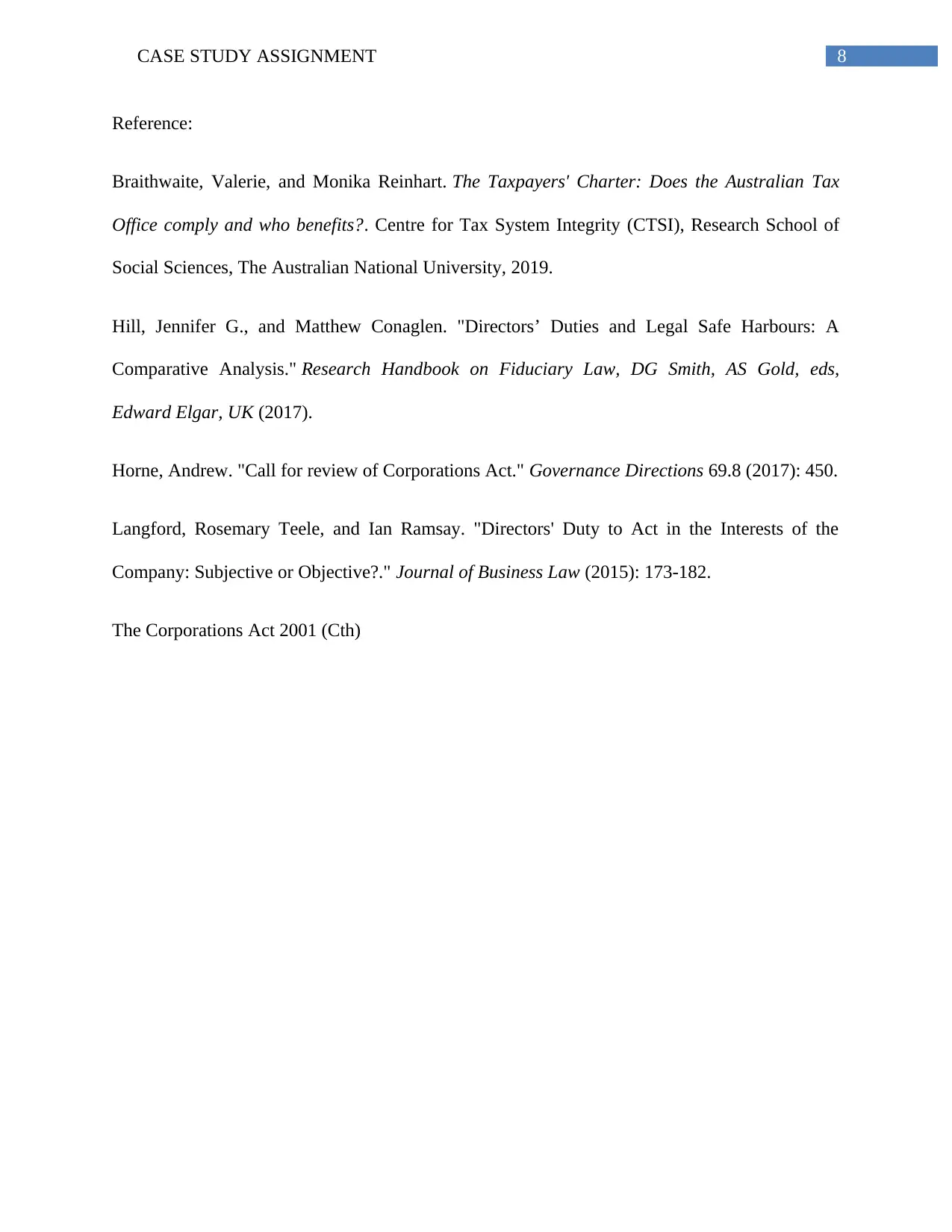
8CASE STUDY ASSIGNMENT
Reference:
Braithwaite, Valerie, and Monika Reinhart. The Taxpayers' Charter: Does the Australian Tax
Office comply and who benefits?. Centre for Tax System Integrity (CTSI), Research School of
Social Sciences, The Australian National University, 2019.
Hill, Jennifer G., and Matthew Conaglen. "Directors’ Duties and Legal Safe Harbours: A
Comparative Analysis." Research Handbook on Fiduciary Law, DG Smith, AS Gold, eds,
Edward Elgar, UK (2017).
Horne, Andrew. "Call for review of Corporations Act." Governance Directions 69.8 (2017): 450.
Langford, Rosemary Teele, and Ian Ramsay. "Directors' Duty to Act in the Interests of the
Company: Subjective or Objective?." Journal of Business Law (2015): 173-182.
The Corporations Act 2001 (Cth)
Reference:
Braithwaite, Valerie, and Monika Reinhart. The Taxpayers' Charter: Does the Australian Tax
Office comply and who benefits?. Centre for Tax System Integrity (CTSI), Research School of
Social Sciences, The Australian National University, 2019.
Hill, Jennifer G., and Matthew Conaglen. "Directors’ Duties and Legal Safe Harbours: A
Comparative Analysis." Research Handbook on Fiduciary Law, DG Smith, AS Gold, eds,
Edward Elgar, UK (2017).
Horne, Andrew. "Call for review of Corporations Act." Governance Directions 69.8 (2017): 450.
Langford, Rosemary Teele, and Ian Ramsay. "Directors' Duty to Act in the Interests of the
Company: Subjective or Objective?." Journal of Business Law (2015): 173-182.
The Corporations Act 2001 (Cth)
⊘ This is a preview!⊘
Do you want full access?
Subscribe today to unlock all pages.

Trusted by 1+ million students worldwide
1 out of 9
Related Documents
Your All-in-One AI-Powered Toolkit for Academic Success.
+13062052269
info@desklib.com
Available 24*7 on WhatsApp / Email
![[object Object]](/_next/static/media/star-bottom.7253800d.svg)
Unlock your academic potential
Copyright © 2020–2025 A2Z Services. All Rights Reserved. Developed and managed by ZUCOL.





